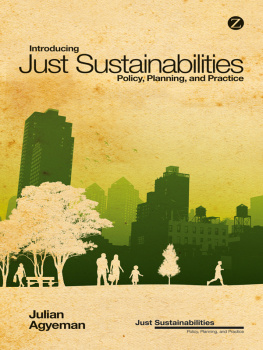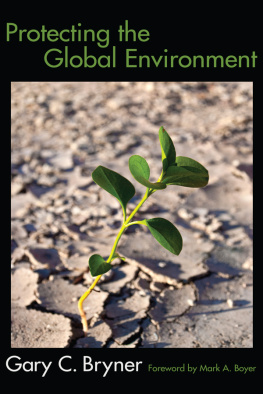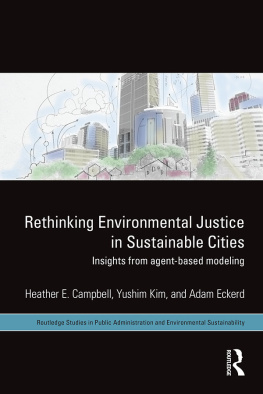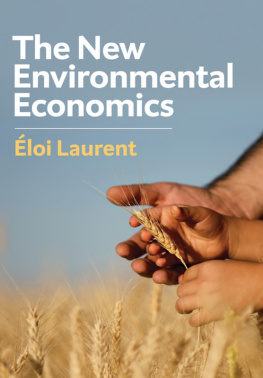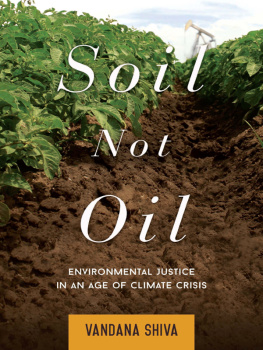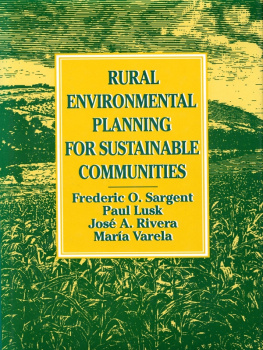Thank you for buying this ebook, published by NYU Press.
Sign up for our e-newsletters to receive information about forthcoming books, special discounts, and more!
Sign Up!
About NYU Press
A publisher of original scholarship since its founding in 1916, New York University Press Produces more than 100 new books each year, with a backlist of 3,000 titles in print. Working across the humanities and social sciences, NYU Press has award-winning lists in sociology, law, cultural and American studies, religion, American history, anthropology, politics, criminology, media and communication, literary studies, and psychology.
Sustainable Communities and the Challenge of Environmental Justice
Sustainable Communities and the Challenge of Environmental Justice
Julian Agyeman

NEW YORK UNIVERSITY PRESS
New York and London
www.nyupress.org
2005 by New York University
All rights reserved
Library of Congress Cataloging-in-Publication Data
Agyeman, Julian.
Sustainable communities and the challenge of environmental justice/
Julian Agyeman.
p. cm.
Includes bibliographical references and index.
ISBN 0-8147-0710-6 (cloth : acid-free paper)
ISBN 0-8147-0711-4 (pbk. : acid-free paper)
1. Environmental justice. 2. Sustainable development. I. Title.
GE220.A34 2005
363.7dc22 2005003742
New York University Press books are printed on acid-free paper,
and their binding materials are chosen for strength and durability.
Manufactured in the United States of America
c 10 9 8 7 6 5 4 3 2 1
p 10 9 8 7 6 5 4 3 2 1
For Janet Clayton and women worldwide fighting breast cancer.
Acknowledgments
It may sound like a clich, but this book was written by many people, not just me. It is the product of hundreds of discussions, arguments, and readings; personal and collective experiences; three academic papers; and far too many late nights. However, in this endeavor, I have numerous people to thank.
First, Rachel Bratt, who, as chair had the confidence to hire me to the Tufts Department of Urban and Environmental Policy and Planning (UEP) in 1999. It is a privilege to be a part of such a scholarly community, where I have been able to develop my ideas in a very supportive environment. Not only did she hire me, but she gave me $5,000 for my first research assistant, UEP student Tom Evans, who contributed greatly to the paper that eventually became .
A few years later, in 2001, Tufts University College of Citizenship and Community Service, through the leadership of Rob Hollister and Molly Mead, great supporters of my work, gave me a $10,000 grant to hire a research assistant, UEP student Briony Angus, who contributed her ideas and research to an article on civic environmentalism that became part of . Thanks also go to UEP student Kirstin Henninger for her invaluable research on deliberative democracy and for her wonderful Austin Powers impressions, and to Jim Coburn for editing my manuscript.
Thanks also go to other colleagues at Tufts. To deans Susan Ernst and Kevin Dunn for agreeing to Junior Faculty Research Leave in the spring semester of 2004; to Sheldon Krimsky for his support, guidance, and invaluable advice; to Francine Jacobs for her candor and sense of humor; to James Jennings for his insights into Roxbury; to Veronica .
I am indebted to Bob Evans (Northumbria University, UK) and Robert D. Bullard (Clark Atlanta University), co-authors of a paper that influenced , and to the group of critical readers I asked to critique early drafts of my (incomplete) manuscript. Kee Warner (University of Colorado, Colorado Springs), David Pellow (University of California, San Diego), Robert Brulle (Drexel University), Sheila Foster (Fordham University), David Schlossberg (Northern Arizona University), J. Timmons Roberts (College of William and Mary), JoAnn Carmin (MIT), Jennifer Hammer (NYU Press), Veronica Eady, and Kent Portney, your comments were perceptive and well made, and any inaccuracies or advice I did not follow are my fault, and my loss.
During spring and early summer 2004, it was my privilege to work with a group of people who I admire greatly, the staff and board of ACE, who gave up their time so freely for me: Bill Shutkin and Charlie Lord (founders), Bob Terrell, James Hoyte, Lisa Goodheart, Gary Gill-Austern, Penn Loh, Warren Goldstein-Gelb, Jodi Sugerman-Brozan, Quita Sullivan, Eugene Benson, Khalida Smalls, and Klare Allen. Marlena Rose, Celina Lee, and Alma Feliciano, forgive me for not interviewing you, but I simply ran out of time. Keep on changing the world, guys.
Finally, to the person without whose support and love I could never have freed myself up to get an MA, let alone a PhD and (hopefully) tenure, my wife, Lynn Graham.
Introduction
ACE as an environmental justice group has always struggled with its relationship with the more traditional or mainstream environmental and sustainability groups. Weve played with them. Clean Buses for Boston was quite intentionally, on my part, an effort to reach out to more mainstream groups in coalition, to bond with them. Frankly, we didnt need them, but we were doing similar work. The Boston Foundation stepped up and then the Public Welfare Foundation and everybody stepped up because what were we doing? We were bringing neighborhood environmental justice organizations together with mainstream environmental and sustainability organizations.
Bill Shutkin, co-founder,
Alternatives for Community and Environment
The relationship between environmental justice and sustainability groups has traditionally been uneasy. What might at first glance seem like an obvious case for partnership, for coalition, is fraught with ideological and other concerns, despite the obvious enthusiasm of funders. How has it come to this, and more to the point, how do we move forward?
Environmental Justice and Sustainability
Environmental justice and sustainability are two concepts that have evolved over the past two decades to provide new, exciting, and challenging directions for public policy and planning. Environmental justice can be understood as a local, grassroots, or bottom-up community reaction to external threats to the health of the community, which have been shown to disproportionately affect people of color and low-income neighborhoods. Sustainability, on the other hand, refers to meeting our needs today while not compromising the ability of those that follow to meet their needs. It emerged in large part from top-down international processes and committees, governmental structures, think tanks, and international nongovernmental organization (NGO) networks, although it is now, like environmental justice, at the grassroots level that much-needed change is happening. Both concepts are highly contested and problematized, but they nevertheless have tremendous potential to effect long-lasting change on a variety of levels, from local to global.
Environmental justice organizations emerged from grassroots activism in the civil rights movement. Whether these organizations are based on neighborhood, community, university, or region and whether they are staffed or unstaffed, they have expanded the dominant traditional environmental discourse, based around environmental stewardship, to include social justice and equity considerations. In doing this, they have redefined the term environment so that the dominant wilderness, greening, and natural resource focus now includes urban disinvestment, racism, homes, jobs, neighborhoods, and communities. The
Next page

